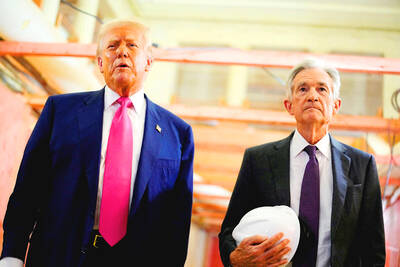After a four-year tug of war, Evertrust Group (永慶集團), parent of Evertrust Rehouse (永慶房屋), earned the right to use its trade name in Shanghai this month after a Chinese company lost an administrative appeal.
A Chinese company registered Evertrust’s Chinese name, “Yongqing,” before it entered the Shanghai market, forcing Evertrust to operate under a different name there.
Company president Benson Liao (廖本勝) said Evertrust was not sure whether its Chinese counterpart had taken its name with malicious intentions. However, the Chinese company did not actually use the name Yongqing and demanded that Evertrust pay millions of New Taiwan dollars for it to drop the rights to the name.
The realtor was not willing to pay such a large sum.
“We had naively thought that a few hundred thousand would do,” he said.
AUTHORITIES
After negotiations led nowhere, Evertrust appealed to the authorities last year, who investigated and granted the rights to the name to Evertrust on the grounds that the Chinese business did not use the name.
The group now plans to change the Chinese name of its 37 Shanghai outlets from Taiqing Rehouse (台慶) to Yongqing. The outlets had been called Taiqing since 2005, Liao said by telephone on Friday.
“Our four years of investing [in the trade name ‘Taiqing’] will be a complete waste, but we’re happy to have our trade name back and we are there to stay,” Liao said. “It will be a fresh start for us in Shanghai.”
Liao estimated that his company’s Shanghai subsidiary would earn NT$300 million (US$9.3 million) in revenue this year compared with NT$20 million in 2006. He said it is the biggest in Shanghai among several Taiwanese realtors.
‘ACTUAL USE’
Liao said Evertrust won back its trade name around the same time that Taiwan Beer (台啤) was granted its trade name in China.
“We applaud the recognition by authorities, either here or in China, of trade names or marks according to their actual use and not registration,” Liao said.
Meanwhile, Evertrust forecast NT$5 billion in revenue by its 510 outlets in Taiwan this year, up 20 percent from the previous year, he said.

IN THE AIR: While most companies said they were committed to North American operations, some added that production and costs would depend on the outcome of a US trade probe Leading local contract electronics makers Wistron Corp (緯創), Quanta Computer Inc (廣達), Inventec Corp (英業達) and Compal Electronics Inc (仁寶) are to maintain their North American expansion plans, despite Washington’s 20 percent tariff on Taiwanese goods. Wistron said it has long maintained a presence in the US, while distributing production across Taiwan, North America, Southeast Asia and Europe. The company is in talks with customers to align capacity with their site preferences, a company official told the Taipei Times by telephone on Friday. The company is still in talks with clients over who would bear the tariff costs, with the outcome pending further

NEGOTIATIONS: Semiconductors play an outsized role in Taiwan’s industrial and economic development and are a major driver of the Taiwan-US trade imbalance With US President Donald Trump threatening to impose tariffs on semiconductors, Taiwan is expected to face a significant challenge, as information and communications technology (ICT) products account for more than 70 percent of its exports to the US, Chung-Hua Institution for Economic Research (CIER, 中華經濟研究院) president Lien Hsien-ming (連賢明) said on Friday. Compared with other countries, semiconductors play a disproportionately large role in Taiwan’s industrial and economic development, Lien said. As the sixth-largest contributor to the US trade deficit, Taiwan recorded a US$73.9 billion trade surplus with the US last year — up from US$47.8 billion in 2023 — driven by strong

AI: Softbank’s stake increases in Nvidia and TSMC reflect Masayoshi Son’s effort to gain a foothold in key nodes of the AI value chain, from chip design to data infrastructure Softbank Group Corp is building up stakes in Nvidia Corp and Taiwan Semiconductor Manufacturing Co (TSMC, 台積電), the latest reflection of founder Masayoshi Son’s focus on the tools and hardware underpinning artificial intelligence (AI). The Japanese technology investor raised its stake in Nvidia to about US$3 billion by the end of March, up from US$1 billion in the prior quarter, regulatory filings showed. It bought about US$330 million worth of TSMC shares and US$170 million in Oracle Corp, they showed. Softbank’s signature Vision Fund has also monetized almost US$2 billion of public and private assets in the first half of this year,

POWELL SUCCESSOR: US Fed Governor Adriana Kugler’s resignation gives Donald Trump an opening on the board, potentially accelerating his decision on the next chair US President Donald Trump suddenly has a chance to fill an opening at the US Federal Reserve earlier than expected, after Fed Governor Adriana Kugler announced her resignation on Friday. It might also force him to pick the next Fed chair months sooner than he had anticipated. “The ball is now in Trump’s court,” LH Meyer/Monetary Policy Analytics Inc economist Derek Tang said. “Trump is the one who’s been putting pressure on the Fed to do this and that, and Trump says he wants to have his own people on. So now he has the opportunity.” Kugler’s exit unfolds amid unprecedented public pressure